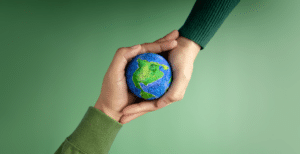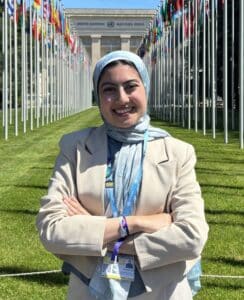Decolonisation as a framework for Youth Partnership in Global Health by Arwa Hany Sharaby

The Sustainable Development Goals (SDGs) recognise that achieving global goals requires collective action and collaboration through Goal 17, Partnerships for the Goals [1]. They emphasise the importance of multi-stakeholder partnerships in global health, involving governments, private sector actors, civil society, and communities, all working together toward common objectives.
The landscape of global health Partnerships has long been shaped by colonial power asymmetries influencing priorities and resource distribution [2]. This underscores the urgent need for decolonial approaches to ensure truly equitable, meaningful collaborations that centre localisation and drive sustainable solutions. Multilateral partnerships in health should be grounded in decolonised principles, facilitating balanced power dynamics and valuing local knowledge, traditions, and practices into health programmes while respecting the agency of all parties involved.
Among the many partnerships that can accelerate progress and bring about prosperity, partnerships with young people stand out as particularly transformative. Today the world has the largest generation of young people in history, making a total of 1.8 billion globally [3]. Youth have been on the frontlines of the world’s most pressing health inequities rooted in colonial legacies [4]. They possess an unrelenting willingness and an endless desire to influence change, bringing in a sense of urgency that is incredibly important within today’s events, as less than 5 years remain to achieving the sustainable development agenda.
Today, youth leadership in addressing climate change – one of the world’s greatest challenges- has played a central role in keeping ambition high and holding leaders accountable. [5] Since 2011, young people have brought different perspectives to climate negotiations through their engagement in the UNFCCC, emphasising the health mediated impact of climate change and the important role health societies play in driving climate solutions that safeguard people’s health and well-being. [6] Outside their contributions to intergovernmental decision making and policies, young people are spearheading locally driven climate solutions, holding spaces to educate and empower children and young people on climate change, and mobilising their local communities through grassroot initiatives. One such initiative is the International Federation of Medical Students’ Association, working across 133 countries where young people are campaigning for sustainable low carbon health systems and calling for a change in medical education policies to include climate change in the curricula.
Despite the contributions of young people in areas like climate action, HIV/AIDS and gender equity, and the untapped potential they bring to addressing global challenges, they continue to face numerous barriers that hinder their meaningful engagement. [7,8] One such barrier is the prevalence of youth tokenism, particularly in global health partnerships, which mirrors colonial practices and perpetuates systemic inequities.
Many youth partnerships are often characterised by tokenisation, where young people are included in discussions or initiatives without truly having a meaningful role in decision-making. This form of engagement often reduces youth participation to a symbolic presence rather than a meaningful contribution, thus reinforcing existing hierarchies instead of dismantling them.
Drawing from this parallel, Youth partnerships often mimic colonial power imbalances with decision-making authority frequently concentrated in the hands of adults, particularly those from the Global North. This dynamic not only limits the influence of young people but also perpetuates systemic inequities, further marginalising their voices and hindering their ability to contribute effectively to global solutions.
To address the systemic barriers faced by young people and unlock their full potential in tackling global health challenges, there is an urgent need for a decolonised framework in youth partnerships. Such a framework would actively dismantle the colonial power dynamics that currently dominate these spaces, redistributing decision-making authority to ensure equitable participation for young people, particularly those from the Global South.
What would a decolonised framework for youth partnership in health look like?
A decolonised framework for youth partnership in health would follow a human rights-based approach, recognising young people as rights holders to meaningful and inclusive participation and access to decision-making spaces in health; such a framework would endeavour to:
- Shift power to youth: This means creating spaces where youth can lead alongside adults, this can include leadership positions within boards or Youth Councils, co-create health priorities and programmes, and engage in meaningful decision-making processes that shape the future of global health.
- Build equitable partnership: positioning young people as equal partners, not as passive recipients of the partnership outcomes, but as direct contributors.
- Address barriers to youth participation: Ensure the provision of funding and resources that would allow for the participation of young people in health programmes and decision-making arenas, particularly young people from the Global South, who make up larger range of the populations in their respective countries.
- Challenge the paradigm of age and expertise by redefining the traditional assumptions that equate authority, knowledge, and decision-making capability with older age, formal credentials or institutional validation, often dismissing the value of lived experiences, fresh perspectives, and innovative ideas that young people bring as partners, capable of contributing meaningfully to discussions and solutions, regardless of their age.
With the 2024 UN Pact for the Future calling for meaningful youth engagement [9], we are presented with a timely opportunity to adopt a new framework; one that rebalances power, centers youth leadership, and reimagines how we partner with young people for lasting change for generations to come.
References:
- Goal 17 | Department of Economic and Social Affairs, United Nations. Available at: https://sdgs.un.org/goals/goal17 (Accessed: 15 April 2025).
- Transforming global health partnerships. (2024). https://doi.org/10.1007/978-3-031-53793-6
- Youth – United Nations Sustainable Development (no date) United Nations. Available at: https://www.un.org/sustainabledevelopment/youth/ (Accessed: 17 April 2025).
- The emerging voices of youth activists, The Lancet, Volume 393, Issue 10183, 1774, https://doi.org/10.1016/S0140-6736(19)30991-2
- Neas, S., Ward, A., & Bowman, B. (2022). Young people’s climate activism: A review of the literature. Frontiers in Political Science, 4. https://doi.org/10.3389/fpos.2022.940876
- Marcalee Alexander, Mohamed Eissa, Ruth McDermott-Levy, Rhiannon Osborne, Elizabeth Pleuss, Poornima Prabhakaran, Cecilia Sorensen, COP26: Looking forward from Glasgow by placing health at the center of climate action, The Journal of Climate Change and Health, Volume 5, 2022, 100117, ISSN 2667-2782, https://doi.org/10.1016/j.joclim.2022.100117.
- Beyond tokenism: meaningful youth engagement in planetary health, Spajic, Luke et al. The Lancet Planetary Health, Volume 3, Issue 9, e373 – e375 https://doi.org/10.1016/S2542-5196(19)30172-X
- UNICEF Innocenti – Global Office of Research and Foresight, Voices for Impact: Meaningful youth engagement in the multilateral system, UNICEF Innocenti, Florence, September 2024.
- (2024) Pact for the Future, Global Digital Compact and Declaration on Future Generations. Available at: https://unsdg.un.org/sites/default/files/2025-03/sotf-pact_for_the_future_adopted.pdf (Accessed: 15 April 2025).
About the Author:
 Arwa H.Sharaby is an Obstetrics and Gynaecology resident doctor at Cairo University Students’ Hospitals with over five years of experience working on meaningful youth engagement in health across international and regional levels, holding influential roles such as Liaison Officer to the WHO within the International Federation of Medical Students’ Associations (IFMSA), where she led delegations to the 154th Executive Board Meeting and the 77th World Health Assembly, and developed youth-driven advocacy strategies. As regional director for the Eastern Mediterranean Region, she fostered partnerships with WHO and UN agencies to amplify youth voices in health and empower young people to drive local action and advocate for equitable health systems. She has also served as a steering committee member of the WHO Youth Council.
Arwa H.Sharaby is an Obstetrics and Gynaecology resident doctor at Cairo University Students’ Hospitals with over five years of experience working on meaningful youth engagement in health across international and regional levels, holding influential roles such as Liaison Officer to the WHO within the International Federation of Medical Students’ Associations (IFMSA), where she led delegations to the 154th Executive Board Meeting and the 77th World Health Assembly, and developed youth-driven advocacy strategies. As regional director for the Eastern Mediterranean Region, she fostered partnerships with WHO and UN agencies to amplify youth voices in health and empower young people to drive local action and advocate for equitable health systems. She has also served as a steering committee member of the WHO Youth Council.
Arwa is currently the chair of partnerships at Women in Global Health Egypt and serves as the medical & partnership Officer at Aziza, a digital tool, where she spearheads the development of evidence-based Sexual and Reproductive Health and Rights (SRHR) content. She is passionate about gender and health systems, aiming to bridge clinical care with advocacy to drive equitable and sustainable healthcare solutions. https://www.linkedin.com/in/arwa-hany-818a281a0/
CATEGORIES
- Restore Humanity Campaign
- Equity in Action Blog
- Training Programmes
- Sponsorship
- Vaccine Equity
- Get Global – Global Health Talks
- Student Outreach Team
- Get Global Young Professionals Talk Global Health
- Global Health Matters – Live Event Series
- Global Health Matters – IGHN Live Event Series
- An initiative of Irish Global Health Network
- ESTHER Ireland and ESTHER Alliance for Global Health Partnerships
- Global Health Matters – Webinar Series
- ESTHER
- IGHN Conferences
- Global Health Conference 2020
- Women in Global Health – Ireland Chapter
- ESTHER Partnerships
- Weekly Webinar Series
- 4th Global Forum on HRH
- Access to Medicines
- Archive Page Weekly COVID Webinars
- Clean Cooking 2019
- Climate Change and Health Conference 2017
- Conference Abstracts
- Conference Materials
- Covid FAQ
- COVID Funding Opportunities
- COVID-19
- COVID-19: Gender Resources
- Dashboard and online resources
- Education
- ESTHER Alliance
- Events
- Events & News
- Funding covid
- Global Health Exchange 2018
- Global Health Exchange 2019
- Global Health symposium 2019
- Health Workforce/HRH
- Homepage Featured
- Homepage recent posts
- IFGH 2011-2012 Conference and Events
- IFGH 2014 Conference
- IFGH Multimedia
- Irish AIDS Day 2017
- Irish News and Feeds
- Key Correspondent Articles
- Key Correspondent News
- Maternal Health
- Multimedia
- News
- News & Events
- Newsletter
- Opportunity
- Our LMIC's Resources for COVID19
- Partner Country News and Feeds
- Past Events
- Policy
- Presentations
- Recurring events
- Reports & Publications
- Research
- Resources
- Student Outreach Group
- Students Corner
- TEDTalks
- TRAINING COURSES FOR HEALTH CARE PROFESSIONALS
- Uncategorized
- Upcoming Events
RECENT POSTS

Impact testimonies- Lombani

Impact Testimony – Shadrick

Power, Inequality, Decolonisation – and Living My Recovery By Bronwyn April

Global Health Without Borders: Reflections on the Power of Diverse Voices

IGHNxEU – Empowering Women for a Healthier Europe

